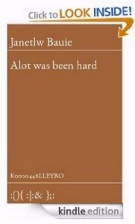
It’s not often I get excited about an ebook that was this bad. But it was so bad, it was good. In fact, this particular Kindle ebook was so surreally awful, that it became a work of art. It was the one ebook so horrible that Amazon had to hunt it down and kill it.
The book’s title was “Alot Was Been Hard”. Its author’s name was Janetlw Bauie. But there was no author — just an unseen presence lurking silently on the web. It was inhuman and utterly unpredictable — but in another sense, the book’s author was us.
“Where does authorship start and end?” wondered two artists in Berlin. So as a digital project, they created a software program which automatically performed every step in the publishing process for an ebook in Amazon’s Kindle Store. And then two weeks ago, in a special press release, they revealed their project’s dark twist. “Our bots are compiling and uploading hundreds of ebooks on Amazon.com with text stolen from the comments on YouTube videos.”
The books had titles like Wierd song you cute by Timsest Pitigam. The fake names were also generated by the computer, so you’d end up with ebooks like Sparta my have by Loafrz Ipalizi. A writer at MIT’s “Technology Review” blog identified those as two of his favorite titles, calling the whole project “a masterpiece of machine-generated unintentional comedy.” But behind it all, the artists insisted, they were trying to make a point.
No one ever gets paid for writing comments on YouTube videos, they observed in their press release. “The creators of user-generated content work for free,” they pointed out, while YouTube distributes their comments — and then earns a profit on it. Apparently their project does the same thing on a much grander scale — but they also saw another message in their project. Professional artists are paid for the works they created, but the 21st century has seen the rise of something different, where paid labor is displaced by “what the artists call the ‘nonsense economy.'” Ultimately they see the comments area on YouTube as a kind of “communication-junk factory.”
But they asked a more fundamental question: how is an ebook different than a traditional book? I’ve often thought that someday, there’ll be someone who invents an entirely new artform which could only happen in a digital book. One of the artists already experimented with this idea, creating a pop-up book whose pages magically incorporate real-time footage of whatever the author happens to be doing right now. The book actually receives live updates over the web, if I understand their description, and “The reader is invited to navigate freely in the between of material and virtual worlds.” (The book appears to be written entirely in German…)
Of course, they also raised some other unintended questions with their book of YouTube comments. “My first thought was about how long it would be until they were sued for copyright infringement,” wrote a blogger at TechDirt. But eventually, someone else got to the artists first. Amazon has apparently deleted all their ebooks — presumably because every book in the Kindle Store should, at the very least, have an actual human author.
It’s a sad end to a wild burst of what can only be called pure craziness. But is it really the end? In a secret fortress on the web, the artists are apparently still brewing up new schemes. Tuesday on their Twitter feed, they pointed to a web page announcing that “Our bots are up and running. Be ready for new releases …” And by this morning they were cranking out new ebooks for Amazon’s Kindle Store, still based entirely on comments stolen from YouTube. Their titles?
This is of woke and half show
Saw click sure but
Usually love what soo
One of the creators wrote about their experiment, and Amazon shutting it down, on our site: http://www.huffingtonpost.com/luc-gross/the-poetry-of-youtube_b_1629065.html